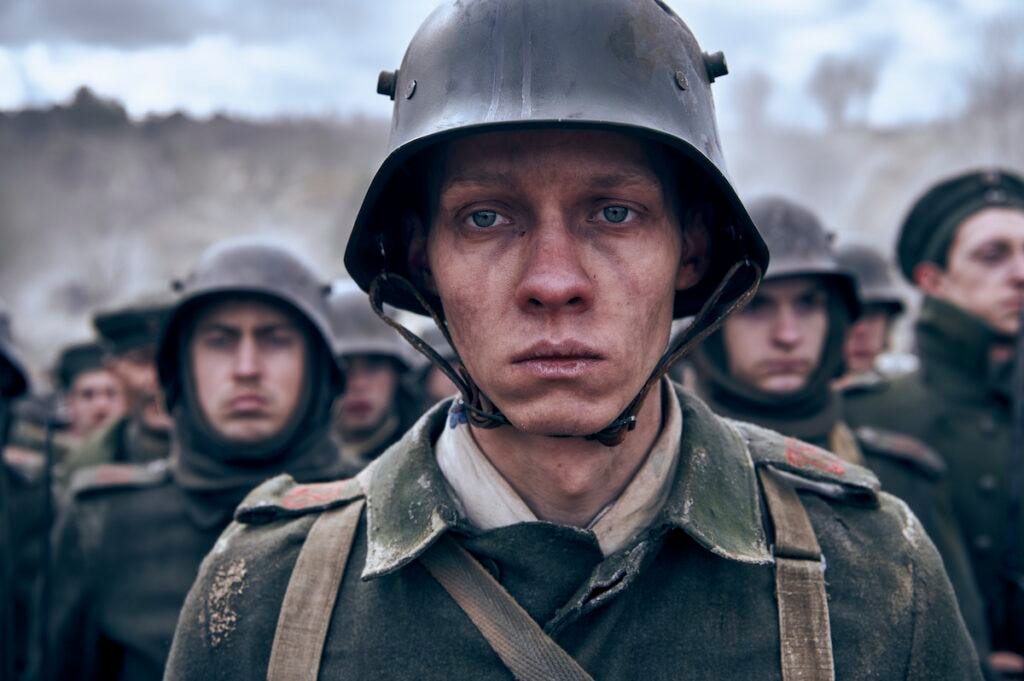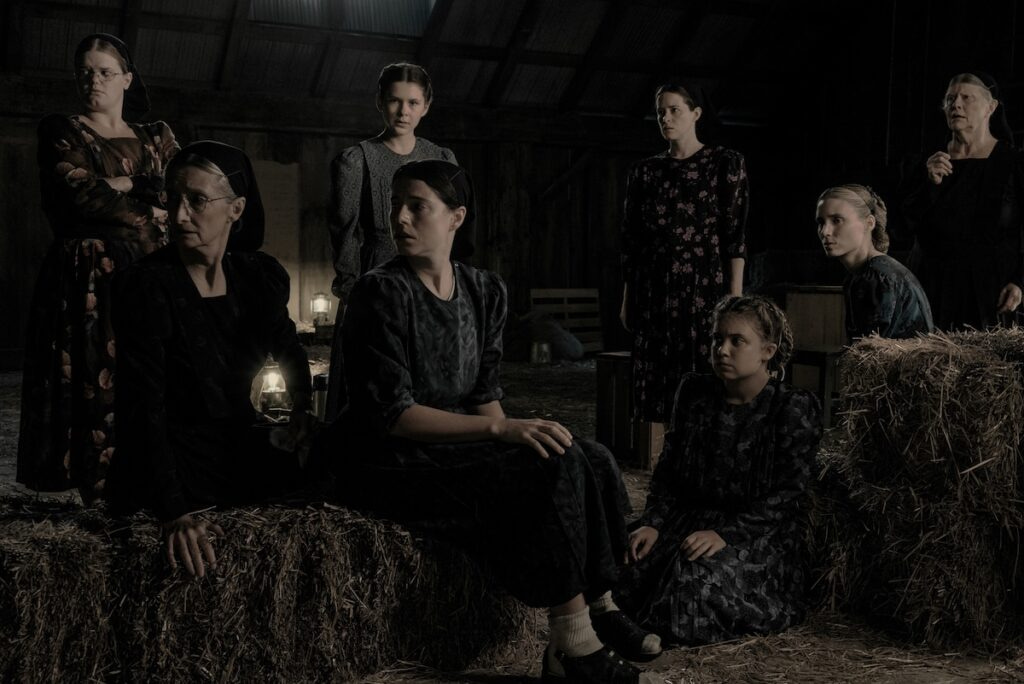Catching Up on the Best Picture Nominees
‘Triangle of Sadness,’ ‘Women Talking,’ and ‘All Quiet on the Western Front’ reviewed.
As a one-man reviewing crew, there are movies that sometimes slip through the cracks. Yes, even the best of the year. While I have seen (and reviewed at each link) Tár, Everything Everywhere All at Once, Top Gun: Maverick, The Banshees of Inisherin, The Fabelmans, Elvis, and Avatar: The Way of Water, there were three of the Best Picture Oscar nominees left to get to on my list. So, from best to worst, here are those remaining three.
There’s a part of me that thinks Ruben Östlund’s latest deconstruction of wealth and privilege and the way the wealthy privileged try to make themselves feel better about their wealth and privilege by engaging in shallow displays of progressive righteousness might have been the picture of the year if it had ended nearly 80 minutes in. It’s around this point that the boat on which the wealthy and privileged are partying sinks, right after the rough seas turned the four-star captain’s dinner into a vomitorium*, the wealthy slipping on their own bodily excretions while the luxury yacht they are on tips up and down over the roiling waters.
It just feels like the whole film is building to this explosion of expulsions. From the travails of models/influencer couple Carl (Harris Dickinson) and Yaya (Charlbi Dean) as they navigate gender roles in the topsy-turvy world of fashion, to the autistic techbro Jarmo (Henrik Dorsin) who offers to buy Yaya a Rolex for offering to take a selfie with him, to the Russian oligarch Dimitry’s (Zlatko Burić) debate with the Communist Captain (Woody Harrelson) that devolves into them reading quotes from Reagan and Marx to each other, the whole thing is so absurd that it can only end with a pie fight’s regurgitory equivalent.
Look, call me a child, call me what you will, but it’s funny to watch people throw up, and it’s doubly funny to watch rich swells throw up and then roll around in it. Östlund really would’ve gone out on a high note here, and we wouldn’t have lost much during the sojourn to the island on which the remaining passengers and crew find themselves after the sinking.
Unfortunately, there’s another hour or so of movie after that. And while there’s undoubtedly some funny stuff here as well—everyone loves to see bigshots get their comeuppance, and comeuppance here comes in the form of Abigail (Dolly de Leon), part of the ship’s cleaning crew and the only one with basic survival skills like fire-building or fishing—the whole thing culminates in a fairly trite restatement of the film’s theme. Wealth corrupts, cycles of abuse perpetuate themselves, and societies are essentially doomed to repeat the mistakes they have made.

Felix Kammerer in 'All Quiet on the Western Front' (Courtesy of Netflix)
Thematic subtlety is, shall we say, lacking from all three of the movies under discussion today. All Quiet on the Western Front relentlessly hammers home the point that war is not only bad and not only brutal, but ultimately pointless as well. No death is too idiotic, no wounding too pointless. There is no heroism to be found in this movie, save, perhaps, near the end, when Paul catapults into a trench during a literal-last-minute offensive designed to help an old general maintain self-regard in the face of catastrophic failure.
In that final scene, Paul (Felix Kammerer) saves the life of a young man and pays for it with his own, taking a bayonet to the chest just moments before the war whistles to a close. It’s like giving up a goal in the 96th minute of a tied World Cup game; you just hate to see it. This is after his closest friend, Katz (Albrecht Schuch) has been shot while the pair tried to steal some eggs from a local farmer. And after another friend stabbed himself in the neck with his own fork rather than go home a cripple. And after all his other friends died in equally pointless, equally terrible ways, squabbling over bare meters of earth with the entrenched French on the other side of No Man’s Land.
I don’t mean to be dismissive of Edward Berger’s film, which is undeniably beautiful (James Friend absolutely deserves his Oscar nomination for best cinematography, and I would be mildly surprised if he doesn’t win) and filled with unquestionably moving performances (Schuch’s turn as Katz is truly heartrending). One might quibble with some of the artistic choices (the score by Volker Bertelmann, which is dominated by an almost industrial sensibility, might match the idea of mechanized warfare but feels out of place with the setting), but the thing as a whole is very well done.
It just … insists upon itself. Much like with Triangle of Sadness, there’s a great movie here. It just happens to be a short film. The first 13 minutes of the film lay out an absolutely wonderful little horror story: a soldier named Heinrich charges out of the trench, terrified as his friends fall around him. Miraculously avoiding the bullets whizzing around him, he pulls his spade and sinks it into the shoulder of a French soldier and Berger cuts to the title card before we see how Heinrich handled himself.
But we can guess from the next series of shots. In a montage, bodies are being cleared from the field, stripped of uniforms, shorn of boots, buried in mass graves. Sure enough, Heinrich’s jacket winds up back at a textile factory, holes being patched for the next hapless recruit … who turns out to be Paul, a boy too young to fight without his parents’ approval. After hearing a rousing speech, he is given a uniform, only to discover, sadly, someone else’s name in it. He’s been given someone else’s jacket, there must be a mistake.
No, no, the clerk assures him. It was probably just too small. Happens all the time. The clerk rips out the name tag and tosses it on the ground, where it falls amongst a group of similar tags. So many names. So many pointless deaths. Such tragedy.
In these 13 minutes we have every idea of All Quiet on the Western Front delivered with devastating subtlety. But subtlety is out this year.

(Courtesy of Orion Releasing)
For final proof of subtlety’s demise, consider Women Talking. It’s the sort of picture that, shortly after it begins, informs us that “WHAT FOLLOWS IS AN ACT OF FEMALE IMAGINATION,” all caps in the original; this, in turn, is the sort of title card that will either make you swoon because you know it’s going to reaffirm most of your priors or make you wince because you know this is a finger on the scale designed to influence critics and awards voters alike. If only She Said had tried something similar it might have nabbed the spot allotted for Best (Feminist) Picture.
In addition to an act of female imagination, what follows is a desaturated and talky mess of a movie, one that never strays too far from the path of didacticism to which it is dedicated. The women of this isolated Mennonite community are talking about what to do in the face of systemic violence from the men in their midst; after discovering that their daughters have been drugged and raped for years by the men in the town, and after learning that the men who had not been arrested planned on bailing out the men who had been arrested, the women are left with three options.
Will they do nothing? Will they stay and fight? Or will they leave this colony forever?
The use of the word “colony” pricked my ears, as this movie comes on the heels of another film that made liberal use of the word colony, Babylon. And, like Babylon, Women Talking is in its own way very much about the movie colony of Hollywood and the sexual degradation and violence that took place therein. An all-star cast of actresses—Claire Foy, Rooney Mara, Jessie Buckley, Frances McDormand, and more—take turns monologuing and shushing Ben Whishaw, whose August is there, quite pointedly, to listen, not speak.
Again, subtlety isn’t really on the menu here, but neither is artistry. It’s a lecture, and not a particularly interesting one. But then, I’m a man so I would say that, wouldn’t I? As such, please feel free to disregard my monstrous opinion. I can’t promise to try to do better in the future, but I’ll try to try.
* Yes, yes, I know that’s not what “vomitorium” is supposed to mean. Deal with it.





